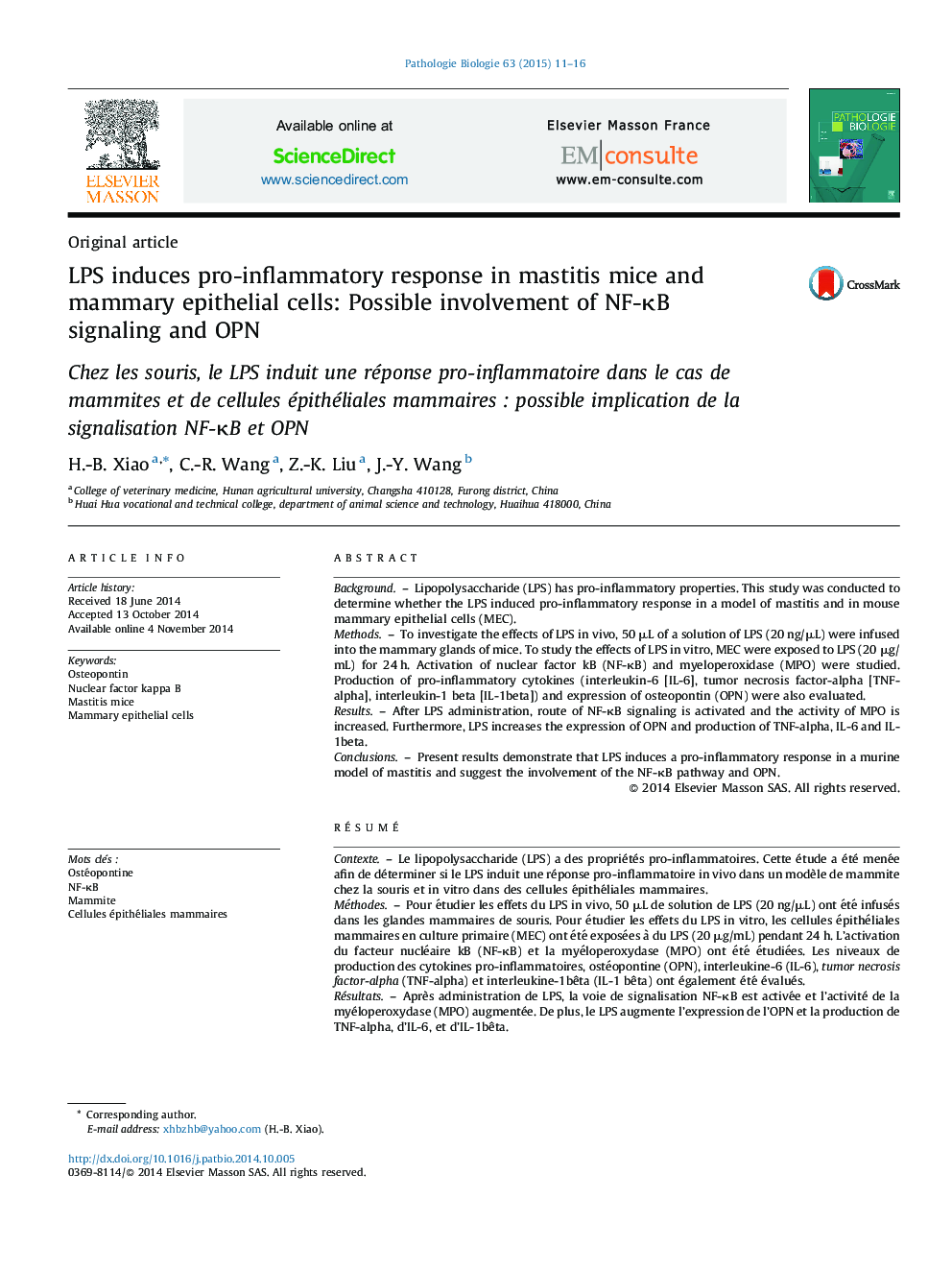| کد مقاله | کد نشریه | سال انتشار | مقاله انگلیسی | نسخه تمام متن |
|---|---|---|---|---|
| 4135970 | 1271887 | 2015 | 6 صفحه PDF | دانلود رایگان |

BackgroundLipopolysaccharide (LPS) has pro-inflammatory properties. This study was conducted to determine whether the LPS induced pro-inflammatory response in a model of mastitis and in mouse mammary epithelial cells (MEC).MethodsTo investigate the effects of LPS in vivo, 50 μL of a solution of LPS (20 ng/μL) were infused into the mammary glands of mice. To study the effects of LPS in vitro, MEC were exposed to LPS (20 μg/mL) for 24 h. Activation of nuclear factor kB (NF-κB) and myeloperoxidase (MPO) were studied. Production of pro-inflammatory cytokines (interleukin-6 [IL-6], tumor necrosis factor-alpha [TNF-alpha], interleukin-1 beta [IL-1beta]) and expression of osteopontin (OPN) were also evaluated.ResultsAfter LPS administration, route of NF-κB signaling is activated and the activity of MPO is increased. Furthermore, LPS increases the expression of OPN and production of TNF-alpha, IL-6 and IL-1beta.ConclusionsPresent results demonstrate that LPS induces a pro-inflammatory response in a murine model of mastitis and suggest the involvement of the NF-κB pathway and OPN.
RésuméContexteLe lipopolysaccharide (LPS) a des propriétés pro-inflammatoires. Cette étude a été menée afin de déterminer si le LPS induit une réponse pro-inflammatoire in vivo dans un modèle de mammite chez la souris et in vitro dans des cellules épithéliales mammaires.MéthodesPour étudier les effets du LPS in vivo, 50 μL de solution de LPS (20 ng/μL) ont été infusés dans les glandes mammaires de souris. Pour étudier les effets du LPS in vitro, les cellules épithéliales mammaires en culture primaire (MEC) ont été exposées à du LPS (20 μg/mL) pendant 24 h. L’activation du facteur nucléaire kB (NF-κB) et la myéloperoxydase (MPO) ont été étudiées. Les niveaux de production des cytokines pro-inflammatoires, ostéopontine (OPN), interleukine-6 (IL-6), tumor necrosis factor-alpha (TNF-alpha) et interleukine-1bêta (IL-1 bêta) ont également été évalués.RésultatsAprès administration de LPS, la voie de signalisation NF-κB est activée et l’activité de la myéloperoxydase (MPO) augmentée. De plus, le LPS augmente l’expression de l’OPN et la production de TNF-alpha, d’IL-6, et d’IL-1bêta.ConclusionsLes résultats présents démontrent que le LPS induit une réponse pro-inflammatoire dans un modèle de mammite murin et suggèrent l’implication de la voie NF-κB et de l’OPN.
Journal: Pathologie Biologie - Volume 63, Issue 1, February 2015, Pages 11–16